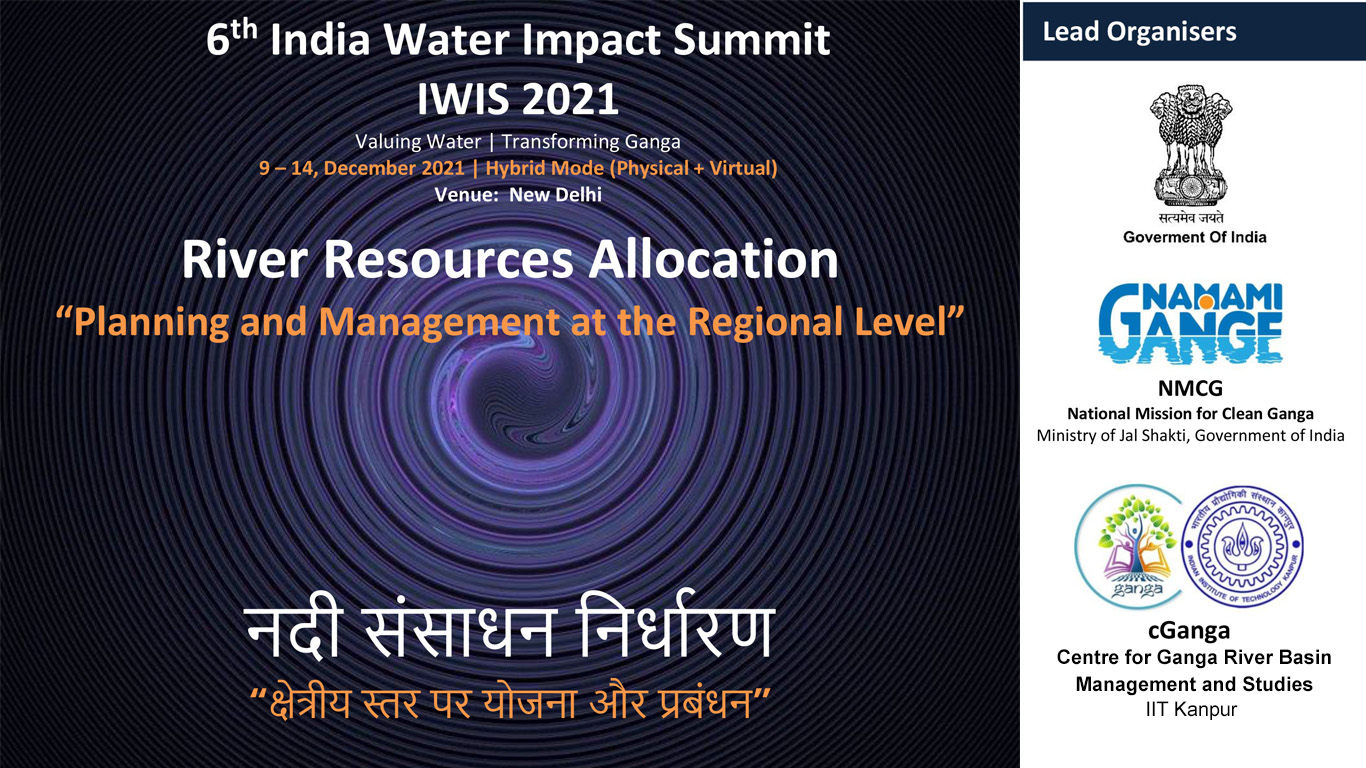Date | Dec 10, 2021:

The 6th India Water Impact Summit (IWIS-2021), jointly organized by the Centre for River Basin Management and Studies (cGanga) and National Mission for Clean Ganga (NMCG), inaugurated on 09th December, 2021. India Water Impact Summit is one of the few select international events focusing on water. Given various restrictions and constraints due to the current pandemic, this year’s IWIS was held mainly online with some physical interactions in Delhi. The theme of this year’s Summit is “Allocation of River Resources: Planning and Management at the Regional Level.”
Dr. Vinod Tare, Founder and Head of cGanga, said that IWIS is a conference in which scientific, management and administrative experts all assemble together for wide-ranging discussions and brainstorming on water management and water conservation. Mr. Rajeev Ranjan Mishra, Director General, NMCG, said that the allocation of river resources is itself a vital subject on which there has been little discourse so far. River scientists are now giving it their utmost attention. This theme was decided for this year’s Summit after intense thought.
Prof. Anshumali, Head, Department of Environmental Science & Engineering and Head Center for Water Resource Management, IIT(ISM) Dhanbad along with other eminent experts from IITs and many foreign nations including Norway, Japan, Australia, European Union and several BRICS countries (Brazil, Russia and China) participate in the Summit. These countries have already consented to work jointly with cGanga on several areas of water management and water conservation. The six-day summit will be conducted in five separate Tracks.
- Track A: This track will consider the value of river services, river resources accounting, and the scientific, technological, policy and working methods for allocation and management of river resources.
- Track B: This track will cover various aspects of the economics and financing of Sludge, Sustainable Agriculture, Water Recycling and Water Trading Market, and Circular Economy.
- Track C: This track will present various new technologies and innovations in the water sector such as digital water, decentralized wastewater treatment, sustainable agriculture, sustainable hydro-power, green hydrogen, waste to bio-gas, inland-water navigation, drinking water systems, energy efficiency, waste to hydrogen, etc.
- Track D: This track will be addressed by international delegates and experts of different countries like Australia, Japan, USA and Britain on their key expertises and experiences such as water rights, waste management, marine pollution, urban water and wastewater management, digital water, and water economy.
- Track E: This track will consider mainly the legislative, policy, and governance challenges and solutions. Rivers are public assets of nations, and checking human interferences in natural streams is not easy in democratic countries. How to make river management feasible without distancing public activities, cultural and tourism-related activities, is the main focus of this track.
Different Stages of the Journey
Since its origin cGanga has been actively involved in river conservation. Today it is a knowledge partner and guide to most administrative agencies. Wide international participation in IWIS is just one reflection of cGanga’s role. This participation includes various agreements for joint activities. Recently cGanga signed an agreement with British Water to work jointly on river and environmental infrastructural development. Similarly, cGanga has also signed several other agreements for joint work with Norway’s Norwegian Institute of Bioeconomy Research (NIBIO) to develop a framework for sludge management.